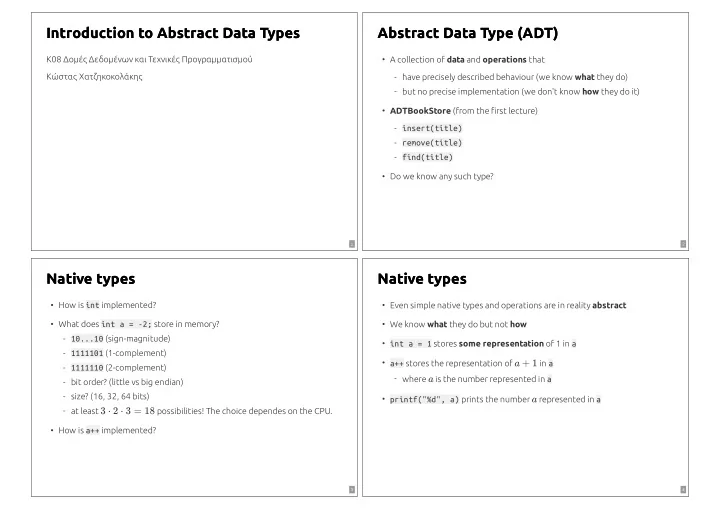

Introduction to Abstract Data Types Introduction to Abstract Data Types Abstract Data Type (ADT) Abstract Data Type (ADT) K08 Δομές Δεδομένων και Τεχνικές Προγραμματισμού • A collection of data and operations that Κώστας Χατζηκοκολάκης - have precisely described behaviour (we know what they do) - but no precise implementation (we don't know how they do it) • ADTBookStore (from the �rst lecture) - insert(title) - remove(title) - find(title) • Do we know any such type? / / 1 2 Native types Native types Native types Native types • How is int implemented? • Even simple native types and operations are in reality abstract • What does int a = -2; store in memory? • We know what they do but not how - 10...10 (sign-magnitude) • int a = 1 stores some representation of 1 in a - 1111101 (1-complement) a + 1 • a++ stores the representation of in a - 1111110 (2-complement) - where is the number represented in a a - bit order? (little vs big endian) - size? (16, 32, 64 bits) • printf("%d", a) prints the number represented in a a - 3 ⋅ 2 ⋅ 3 = 18 at least possibilities! The choice dependes on the CPU. • How is a++ implemented? / / 3 4
Why? Why? Writing our own ADTs Writing our own ADTs 1. We can write programs without thinking (or even knowing) about how • ADTFoo will be represented by the module ADTFoo.h these operations are implemented - Declare a list of functions, constants, typedefs, etc • use complicated algorithms easily - Describe what the module does, with documentation! 2. We can change the implementation of int (eg change the CPU) without • To use ADTFoo changing the code - #include "ADTFoo.h" • easy maintenance - Call its methods, eg foo_create() It would be impossible to write complex programs without these features! - Link with foo.o (or some library containing it) • To implement ADTFoo - Create foo.c , implementing all functions - The implementation should match the advertised behaviour / / 5 6 Containers Containers ADT Overview ADT Overview • The ADTs we learn in this class are containers ADT Description ADTVector An abstract growable “array” - They allow to insert data (stored in the container) ADTList Insert at any position, no “random access” - Then retrieve it in di�erent ways ADTQueue First-in, First-out - And remove it ADTStack Last-in, First-out • Store values of any type : void* ADTPriorityQueue Fast-access of the maximum element • They have similar interfaces ADTMap Associate key => value (array with any type of index) - Di�er in the way data is inserted/removed/retrieved ADTSet Ordered collection of unique items / / 7 8
Naming Naming A typical container ADTFoo A typical container ADTFoo • We use di�erent names for ADTs and Data Structures // ADTFoo.h // Ένα foo αναπαριστάται από τον τύπο Foo. Ο χρήστης δε χρειάζεται να - eg. ADTVector implemented by a Dynamic Array // γνωρίζει το περιεχόμενο του τύπου αυτού, απλά χρησιμοποιεί τις συν // foo_* που δέχονται και επιστρέφουν Foo. • Loosely following the naming of the C++ standard library typedef struct foo * Foo; • Be careful: each ADT/DS is known under many di�erent names • We use an incomplete struct to hide the implementation - also: the same name is often used for ADTs and DSs • The user cannot create struct foo variables or access their content • Remember the substance, not just the names! • We can only store pointers to struct foo created by the module - called handles - using the Foo typedef we forget that they are pointers! • And pass them to other methods / / 9 10 A typical container ADTFoo A typical container ADTFoo A typical use of ADTFoo A typical use of ADTFoo // Δημιουργεί και επιστρέφει ένα νεό foo // program.c Foo foo_create(); #include "ADTFoo.h" // Επιστρέφει τον αριθμό στοιχείων που περιέχει το foo int main() { Foo foo = foo_create(); int foo_size(Foo foo); // insert // Προσθέτει την τιμή value στο foo int a = 1, b = 2; foo_insert(foo, &a); void foo_insert(Foo foo, Pointer value, ...); foo_insert(foo, &b); // Αφαιρεί και επιστρέφει μια τιμή από το foo // remove foo_remove(foo, ...); Pointer foo_remove(Foo foo, ...); // find // Βρίσκει και επιστρέφει ένα στοιχείο από το foo int* value = foo_find(foo, ...); printf("found: %d", *value); Pointer foo_find(Foo foo, ...); // free memory // Ελευθερώνει όλη τη μνήμη που δεσμεύει το foo foo_destroy(foo); } void foo_destroy(Foo foo); / / 11 12
Many containers allow iterating Many containers allow iterating Using the concept of node . Foo foo = foo_create(); // ...insert... // Διάσχιση όλων των στοιχείων (η σειρά εξαρτάται από τον ADT) for (FooNode node = foo_first(foo); // ξενικάμε από τον πρώτο node != FOO_EOF; // μέχρι να φτάσουμε στο node = foo_next(foo, node)) { // μετάβαση στον επόμενο int* value = foo_node_value(foo, node); // η τιμή του συγκεκριμέν printf("value: %d \n ", *value); } / 13
Recommend
More recommend